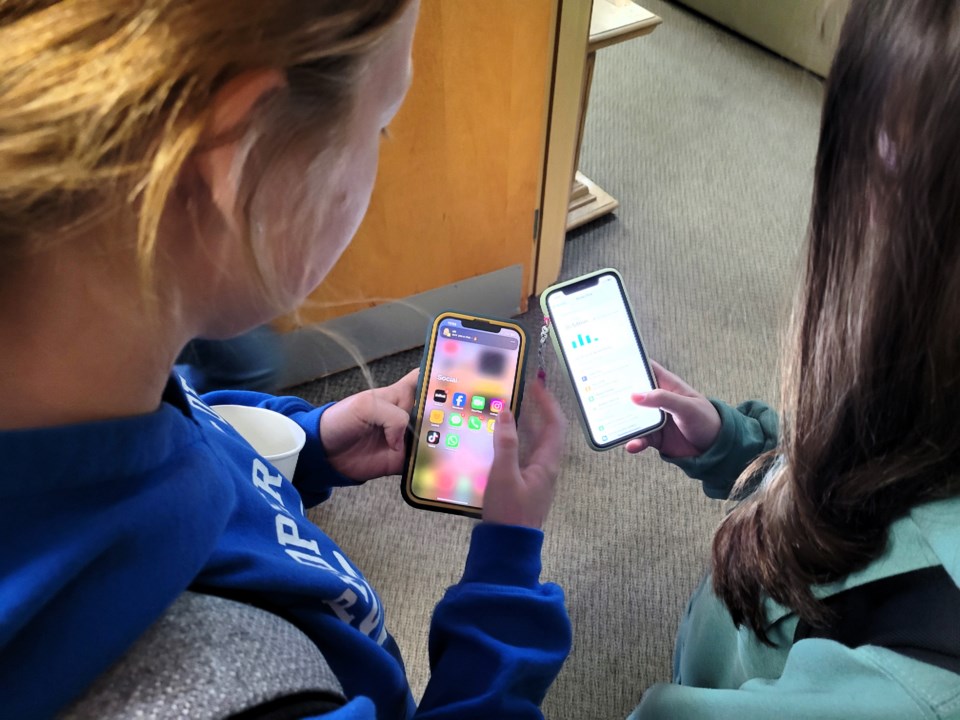With the 2024-25 school year bell set to ring for the first time on Sept. 3, school boards are preparing for the new cellphone rules announced by the Ministry of Education earlier this year.
Although at the Simcoe County District School Board, not a lot is changing.
During the regular meeting of the board on Aug. 28, trustees requested an update on the changes to the code of conduct regarding mobile devices coming to all of the board’s 103 schools across Simcoe County starting on Tuesday.
“I’ve seen a lot of ads about the upcoming cellphone ban,” said Adjala-Tosorontio/Clearview/CFB Borden/Essa trustee Brandy Rafeek during the meeting. “I’m trying to find clarity on how this is different from what we’ve been doing normally.”
An infographic distributed to schools across the board this week ahead of the school year start outlines the new rules, which include that students are not to use personal mobile devices during instructional time, except for health/medical purposes, to support special education needs or for educational purposes as outlined by an educator.
Students in kindergarten to Grade 6 must keep phones stored out of view and turned off/on silent throughout the school day, while students grades 7 to 12 must do the same but only during instructional time.
Under the province’s policy/program memorandum, educators are also not to use personal mobile devices during instructional time, unless explicitly for work-related purposes.
In April, then-education minister Stephen Lecce first announced the cellphone ban for the 2024 fall semester to “help reduce distractions in our schools,” to help students focus during instructional time. The new rules, which were then passed on to school boards through the memorandum at the end of June, will impact all of Ontario’s 4,500 public schools.
Superintendent of education Scott Young said while the word “ban” has been used numerous times in advertisements and messaging from the province, the actual policy document outlines more of a restriction on the use of mobile devices.
“We’ve landed on (regulating this) through our code of conduct,” he said. “In my humble opinion, this only works with families working with us.”
If a student is found to be in breach of the new policy, the board will institute progressive discipline, which means a student will first be spoken to about putting their phone away before moving to more serious forms of discipline, which can include confiscating the device, having meetings with school administration, calls home to families, or suspensions.
“We do this in classrooms anyway — we start with preventative measures. There are going to be warnings and conversations. It’s not hard and fast,” said Young in an interview following the meeting. “Discipline now looks a lot different than it did years ago. It’s about learning.”
During Wednesday’s meeting, Rafeek shared concerns that students would not heed the new rules.
“I’m picturing a teacher in a classroom just spending their whole period telling kids to get off their phone. Are we going to see a great change on Tuesday? I don’t feel we are,” she said.
“We’re putting it all in the hands of the classroom teachers.”
Young said professional development is planned in two sessions throughout September for educators to learn more about the change and how it can be best enforced in classrooms.
“We’ve always done this, but we now have some clear, delineated rules, expectations and exemptions,” he said.
As part of a letter sent home to families, director of education John Dance notes parents and guardians can always contact their children at school by calling the school’s main office, instead of relying on a mobile device.
“Personal mobile devices are a significant distraction for students at school, especially in the classroom,” he wrote. “They can lead to students being disengaged from their learning and isolated from their peers.”
The board’s full policy on the use of mobile devices in schools can be found here.



